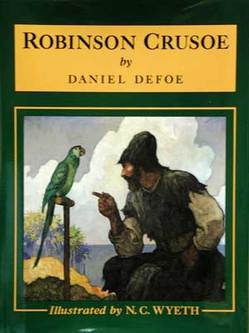This Week's Recommended Read: 'Robinson Crusoe' by Daniel Defoe

Robinson Crusoe is considered one of the first English novels.

Preview…Daniel Defoe’s “Robinson Crusoe” has had an inarguably enormous effect on the literature of today. Widely considered the first English novel, it recounts the “life and strange surprising adventures” of its protagonist, who is marooned on an unidentified South American island for 28 years before he is able to return to Europe.
Crusoe lives in utter solitude for 25 years. Not a skilled tradesman, he must teach himself various crafts to aid in his comfort and basic survival. The simplest things take great amounts of time—our hero spends 42 days making a single shelf! Crusoe also spends a substantial amount of time reflecting on his plight in a spiritual manner. He alternately cries out to God for deliverance and praises his maker for sparing him death at sea.
One day, Crusoe sees a human footprint on the shore of his beach. He agonizes over its possible implications, restricting his activity for nearly seven years in order to remain safe. Later, he is able to rescue the intended victim of cannibalistic feasting, a young man he names Friday. Friday pledges himself to a life of servitude under Crusoe and is made “civilized” by learning the English language and religion and undergoing modest dietary changes. Friday quickly becomes indispensable to Crusoe as a companion and fellow survivor. He helps Crusoe defend the island and secure resources. He also offers valuable company.
How does social isolation affect the human psyche? How is religion a valuable coping mechanism? How does “Robinson Crusoe” espouse the protestant work ethic? Most interestingly, how does Crusoe finally escape, and how does he react upon his return to England after so many years alone on the island?
Although I find the novel a bit tedious at times, no one can deny its literary and cultural import or help but wonder how she might react if cast into a similar condition.
You may like this book if…you wonder how extreme isolation might affect the human mind; you like reading a character’s spiritual musings; you want to read the original survival novel; you just have to see what happens to Crusoe; you find cannibals to be interesting; you want to read a political/ moral portrait of the time; you want some pointers on making the best of a hopeless situation—just in case. You may not like this book if…you expect the plot to follow the traditional story arc that is prominent in literature today; you are distracted by archaic grammar and spellings (viz., perswasion, prophetick); you can’t feel pity for a man who massacres cats; you can’t fathom reading about a society of cannibals—your brain is just too visual; you are too upset by ethnocentric, culturally imperialistic overtones; you desire a sense of immediacy to help heighten the conflict and sustain interest; religious back-and-forth annoys you. Melissa LR Handa is the founder and organizer for the Ann Arbor Classics Book Group and the Lead Books Contributor for AnnArbor.com. Her goal is to make classic literature more accessible to the everyday reader.

